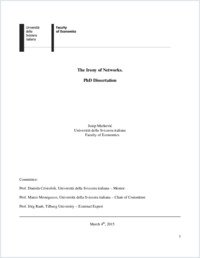The irony of networks
- Markovic, Josip
- Cristofoli, Daniela (Degree supervisor)
-
04.03.2015
106 p
Thèse de doctorat: Università della Svizzera italiana, 2015
English
By the end of the 1970s, it became evident that hierarchies were not always the most efficient and effective solution for complex problems in increasingly plural and fragmented societies. During the last 40 years governance structures and practices in the public sector have shifted towards new logics that direct the way the public sector is functioning. This dissertation deals with use of networks as new governance systems for policy implementation and public service delivery. Based on a mixed-methods approach, three studies investigate the configurational effects of network environment, network structures and coordination practices on public network effectiveness. They improve the understanding of the joint effects of network context, the structure of interorganizational relationships and the governance practices applied in order to organize and coordinate the common efforts of networked organizations. The results show that a network, despite being a distinct resource allocation mechanism, makes use of practices primarily typical for hierarchies and markets. Therefore, networks provide a flexible governance system that allows for vertical integration, bureaucratic means of organization and managerial steering, which in turn allow networks to be successful, if coherently applied.
- Language
-
- English
- Classification
- Economics
- License
-
License undefined
- Identifiers
-
- RERO DOC 235625
- URN urn:nbn:ch:rero-006-113893
- ARK ark:/12658/srd1318769
- Persistent URL
- https://n2t.net/ark:/12658/srd1318769
Statistics
Document views: 361
File downloads:
- Texte intégral: 176
